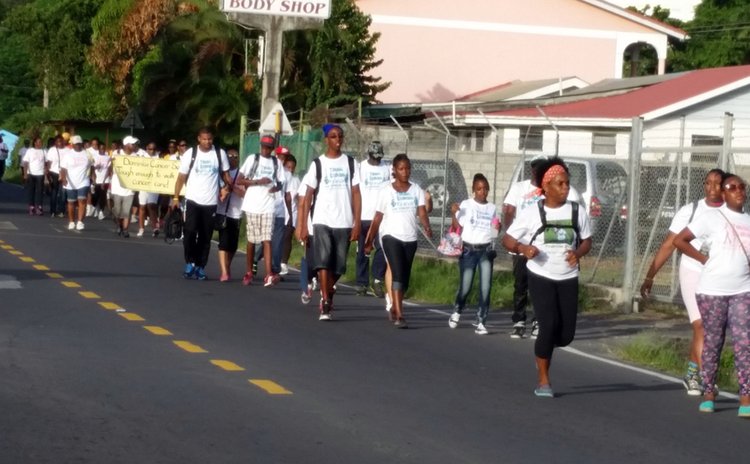Dominicans walk for cancer

The Dominica Cancer Society (DCS) held its 2014 Walk for Cancer today Saturday 5th October. Like in previous years, dozens of persons walked for the cause from Massacre and Pointe Michel to the Windsor Park Stadium where they attended the closing ceremony.
According to Kathleen Cornelius, the president of the DCS the objectives of the DCS are to create awareness of the availability of care and treatment among persons affected by the disease and to provide emotional and psychological care for persons who have been diagnosed with cancer. Last year's "Walk for Cancer" raised about EC$44,000; that sum was used to assist persons who needed cancer treatment.
"We walk to support our brothers," Cornelius said at the 2013 event; in 2014 she is also expected to stress the importance of early diagnosis.
"Persons do not do their screenings on time," she said in a 2013 speech at the rally that followed the walk.
"When they are diagnosed with the disease it is done at a very late stage and that contributes to the number of persons who are succumbing to the disease. Often when persons are diagnosed with the disease persons tell them a lot of things that are untrue, a lot of rumours. So what the Society does, it steps in and it educates the person that having cancer is not a death sentence," she said
Cancer, according to Epidemiologist Dr. Paul Rickets, who delivered the feature address at the closing ceremony in 2013, is a broad term used to describe a range of diseases that can affect any part of the body.
"What it is, is when we have rapid development and spread of abnormal cells which extend beyond the usual boundaries in a particular part of the body," Dr. Rickets said.
A number of factors can contribute to cancer. These include genetics; physical agents such as sunlight and ultra violet light; certain chemicals and specific viruses.
"Ageing is also a very important factor in the development of cancer," Dr. Rickets said.
To reduce the risk of cancer, one needs to avoid the excess use of alcohol and tobacco; consume a healthy diet and undertake frequent physical activities and avoid hepatitis and the human papilloma virus.
But Dominicans are at serious risk of being affected by cancer because of their lifestyles, Dr. Rickets said. According to a survey conducted in 2008 to measure risk factors for chronic diseases, 11 percent of the population between the ages of 15-64 indicated that they smoked; 16 percent of men and four percent of women smoked.
According to the survey, 80 percent of the Dominican population were drinking alcohol; 33 percent of men and 16 percent of women said they drink heavily.
"I know it is very cultural for us to drink but we really have to pay attention to the amount that we drink," Dr. Rickets said. "Because this can be a factor for cancer as well as for other effects and other social effects."
In addition to these risk factors, the majority of men and women (90 % of men and 92% of women) do not eat the recommended daily portions of fruit and vegetables, Dr. Rickets said. Physical activity among both men were also extremely low.
"This is also reflected in the physical measurements, so that almost one half of our women-49 percent- were either overweight or obese. Twenty eight percent of men were either overweight or obese," Dr. Rickets said. "We need to take stock and especially women need to keep their bodies bubbling."
He said about "30 percent of cancer deaths can be prevented by modifying or avoiding key risk factors such as tobacco use over-weight and obesity, unhealthy diet, lack of physical exercise, alcoholism, sexual transmitted HPV infections and air pollution."
Since Dominicans are not taking measures to detect cancer early and they are not keeping the disease out by eating right and exercising, the number of deaths caused by cancer has been rising. World-wide the number of deaths due to cancer exceeds 7.6 million.
"In Dominica cancer is also the leading cause of illness and death," Dr. Rickets said. "The most common cancer diagnosed at the Princess Margaret lab last year was breast cancer. There's an upward trend in the diagnosis of breast cancer. So that in 2008 there were 15 cases of breast cancer and last year there were 20."
Dr. Rickets added: "Prostate cancer, however is the number one cause of death in Dominica, period. And the trend in prostate cancer death is upward… Among women breast cancer is the leading cause of death and the trend is upward."




